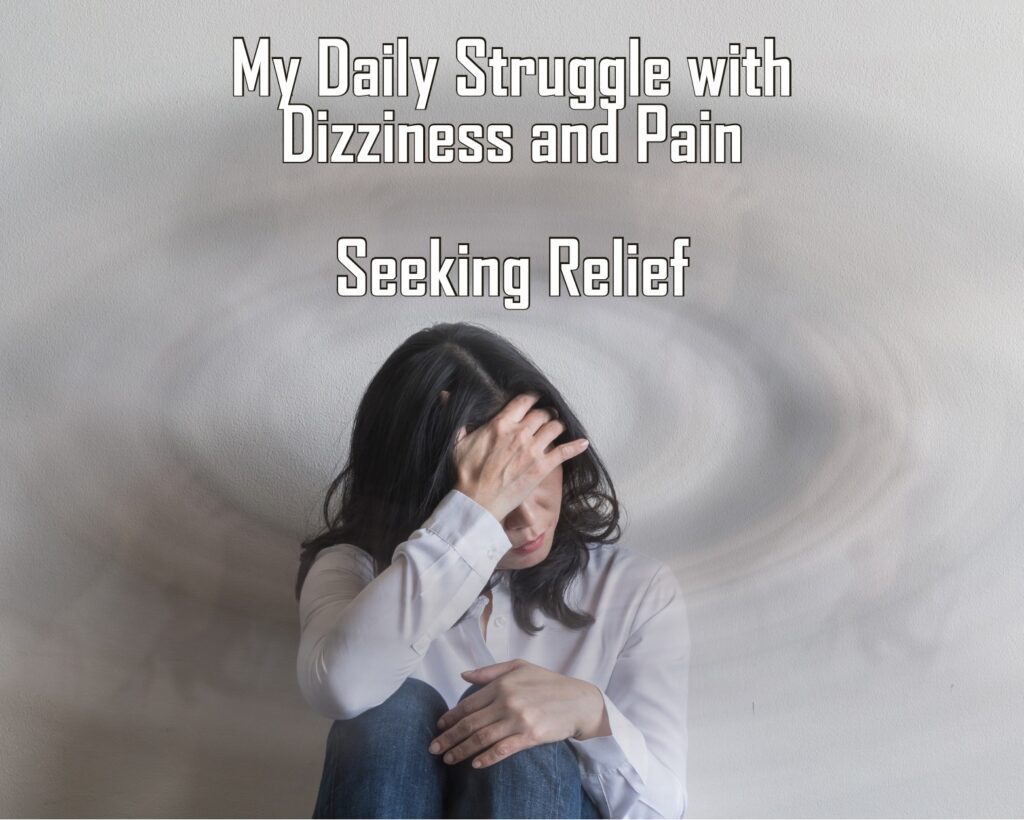Living with Chronic Discomfort
Every morning, I wake up feeling somewhat “normal,” but as soon as I start my daily tasks like looking down to do dishes, dressing my kids, or doing laundry, the dizziness and off-balance sensations come rushing back. It’s as if the floor is sinking beneath my feet. The pain in my suboccipital muscles, right behind my ears, my upper neck, and now even my upper back and shoulders, is relentless. It feels like my head weighs a thousand pounds, and the headaches that stem from my neck pain are just unbearable. How is one supposed to cope with this?

The Challenge of Finding Relief
I’ve tried physical therapy, but it often triggers more dizziness, especially during massages and certain exercises. It’s a miserable way to live, feeling like the only relief comes from sitting still or lying down. I’m considering getting another physical therapy referral, but I’m apprehensive due to my past experiences.
Discovering a Potential Solution
In my search for some form of relief, I came across the 🌟 Shiatsu Neck and Back Massager with Soothing Heat by Nekteck 🌟. This electric deep tissue massager promises to provide relief for shoulder, leg, and body muscle pain, which sounds like exactly what I need.
Why I’m Considering the Nekteck Massager
- Targeted Relief: The idea of having a device that can specifically target the areas where I experience the most pain is appealing. The Shiatsu massager is designed to focus on deep tissues, which could help alleviate some of my muscle tension.
- Soothing Heat: The added feature of heat is something that I find particularly comforting. Heat therapy is known to help relax muscles and improve blood circulation, which might reduce some of my discomfort.
- Convenience: Being able to use this massager at home, in the office, or even in the car means I can seek relief wherever I am, fitting into my daily routine without much hassle.
My Hopes
I’m hopeful that the 🌟 Nekteck Shiatsu Massager 🌟 could be a step towards managing my symptoms better. The thought of potentially finding some relief without triggering more dizziness is a ray of hope in my daily battle with pain and imbalance.
Moving Forward
Living with constant dizziness and pain is a challenging journey, and finding effective ways to cope is crucial. While I’m cautious about new treatments due to past experiences, I’m also open to exploring options like the Nekteck massager that offer a non-invasive way to potentially ease my discomfort. Here’s to hoping for better days ahead.
Exploring Chronic Pain and Dizziness: Insights from Health Survivalist
Health Survivalist offers a range of articles that delve into managing chronic conditions like neck and shoulder pain, which often contribute to symptoms like dizziness and discomfort. Here are some articles from their site that might provide further understanding and coping strategies:
- Physical Therapy for Chronic Neck and Shoulder Pain: This article discusses the role of physical therapy in managing chronic neck and shoulder pain, offering insights into various therapeutic approaches that might help alleviate these symptoms.
- Persistent Neck Pain and Associated Symptoms – Dizziness & Burning Pain: Here, you can explore the connection between chronic neck pain and symptoms like dizziness and burning pain, providing a deeper understanding of how these conditions are interrelated.
- Soothing Sinus Troubles with a Therapeutic Bath: My Personal Experience: This personal account details how therapeutic baths, potentially with products like the 🌟 Shiatsu Neck and Back Massager with Soothing Heat 🌟, can offer relief from sinus troubles, which may be contributing to your overall discomfort.
Additional Tips and Strategies for Managing Chronic Pain and Dizziness
Living with chronic pain and dizziness can be overwhelming, but there are several strategies and lifestyle adjustments that can help in managing these conditions more effectively.
Gentle Exercise and Stretching
- Yoga and Pilates: Gentle forms of exercise like yoga and Pilates can help in strengthening the muscles and improving posture, which can alleviate some of the pain, especially in the neck and upper back.
- Regular Stretching: Incorporating daily stretching routines can reduce muscle tension and improve overall flexibility, potentially lessening pain and dizziness.
Mindfulness and Relaxation Techniques
- Meditation: Practices like meditation can help in managing the stress and anxiety that often accompany chronic pain.
- Deep Breathing Exercises: These can be particularly helpful in moments of intense dizziness, helping to calm the nervous system and reduce the severity of the symptoms.
Ergonomic Adjustments
- Work and Home Environment: Making ergonomic adjustments to your work and home environments can significantly impact your comfort levels. Ensure that your seating and work areas support good posture.
- Screen Time: Be mindful of the amount of time spent looking down at screens, as this can exacerbate neck pain and dizziness.
Diet and Hydration
- Balanced Diet: Eating a balanced diet rich in anti-inflammatory foods can help in managing chronic pain.
- Stay Hydrated: Adequate hydration is essential, especially if dizziness is a frequent symptom.
Seeking Professional Help
- Consult Specialists: Regular consultations with healthcare professionals like physiotherapists, chiropractors, or neurologists can provide tailored advice and treatment plans.
- Counseling or Therapy: For the emotional and mental toll of chronic conditions, seeking support from a counselor or therapist can be beneficial.
Using Supportive Devices
- Massagers and Heat Therapy: Products like the 🌟 Shiatsu Neck and Back Massager with Soothing Heat 🌟 can offer temporary relief from muscle pain and tension.
- Supportive Pillows: Using ergonomic pillows for sleeping can help in maintaining proper neck alignment, reducing pain and stiffness.
Keeping a Symptom Diary
- Track Your Symptoms: Keeping a diary of your symptoms, including their frequency, duration, and triggers, can help in identifying patterns and effective coping strategies.
Managing chronic pain and dizziness requires a multifaceted approach that includes lifestyle changes, therapeutic practices, and professional guidance. By exploring different strategies and being proactive about your health, you can find ways to cope with these challenging conditions and improve your quality of life. Remember, each person’s experience with chronic pain and dizziness is unique, so it’s important to find what works best for you.
As an Amazon Associate we earn from qualifying purchases through some links in our articles.




